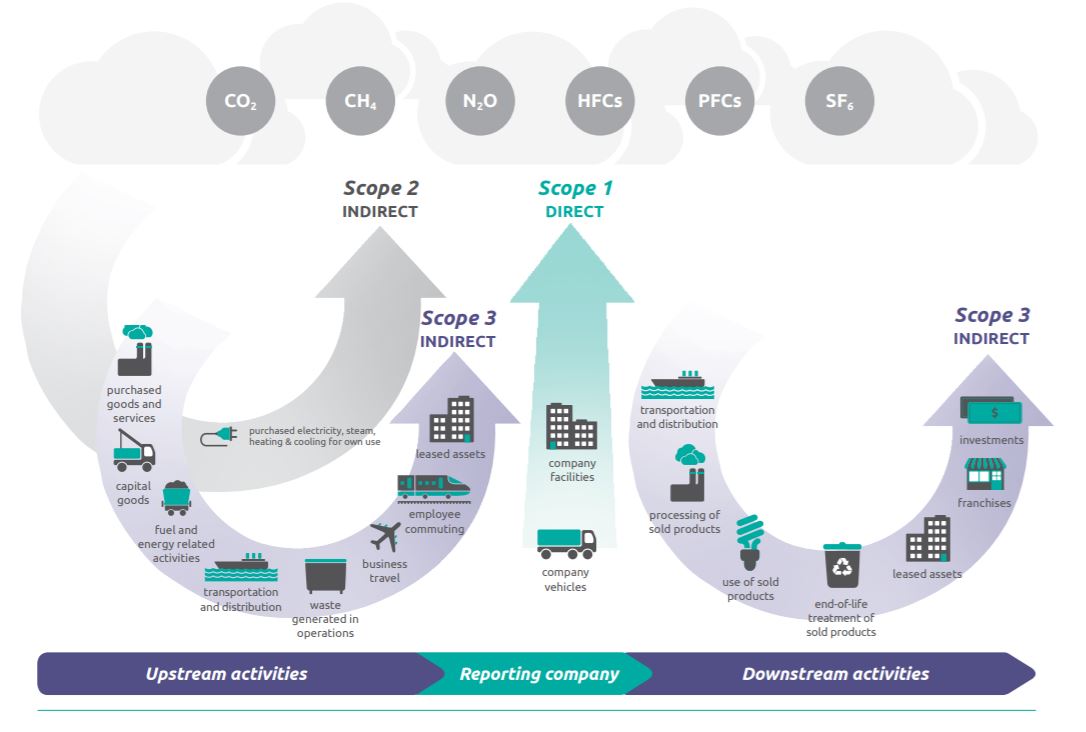Business carbon footprint refers to the total amount of greenhouse gases that are emitted as a result of the company’s activities. This includes emissions from both operational and non-operational sources.
There are many things that contribute to business carbon footprints such as energy use, transportation, and waste production. Calculating your business’s carbon footprint is the first step to reducing it.
Table of Contents
What Is a Business Carbon Footprint?
A carbon footprint is the total amount of greenhouse gases emitted by an individual, event, organization, service, or product, expressed as carbon dioxide equivalent.
For businesses, their carbon footprint is the total amount of greenhouse gases emitted by all business activities. This includes emissions from employee travel, company vehicles, business air travel, electricity use, waste, and water use.
Reducing your business carbon footprint can be good for the environment and your bottom line. It can also make your business more attractive to customers and employees who are interested in supporting green businesses.
There are a number of ways to reduce a business’s carbon footprint.
You can switch to renewable energy sources, increase energy efficiency, reduce waste, and encourage sustainable travel options for employees. You can also offset your carbon footprint by investing in carbon offset projects.
These are projects that help to reduce greenhouse gas emissions in the atmosphere. Making even small changes in your business can make a big difference in the fight against climate change.
What’s the Average Company Carbon Footprint?
According to a report by the World Bank, the average carbon footprint for a company is approximately 16,000 metric tons of CO2e per year.
The report also found that the manufacturing sector has the highest average carbon footprint, at 23,000 metric tons of CO2e per year.
How to Calculate Your Business’s Carbon Footprint
Carbon footprints can be a tricky thing to calculate, but it’s important to know your business’s carbon footprint in order to reduce it.
Here are a few tips on how to calculate your business’s carbon footprint.
1. Know Your Emissions Sources
This includes everything from electricity and natural gas consumption to business travel.
2. Use an Emissions Calculator
There are many different calculators available online so find one that best suits your company’s needs.
3. Include all Relevant Factors
This includes things like the number of employees, the size of your office or factory, and your company’s vehicle fleet.
4. Use the Most Recent Data Available
Emissions data changes over time so be sure to use the most up-to-date information.
5. Compare Your Results to Similar Businesses
This will help you see where your company stands in terms of emissions and where you can improve.
Why Reducing Your Business’s Carbon Footprint Is Important
As a business owner, you are always looking for ways to reduce costs and improve your bottom line.
But what about reducing your business’s carbon footprint?
Emissions can come from a variety of sources, including the burning of fossil fuels, the manufacturing of products, and the disposal of waste.
You may be thinking, what is a carbon footprint and why should I care?
There are a few reasons.
First, it’s good for the environment. Reducing your carbon footprint can help reduce air pollution and slow down climate change.
Second, it’s good for your business. Reducing your carbon footprint can help you save money on energy costs, and it can make your business more attractive to customers and investors who are interested in supporting companies that are working to reduce their environmental impact.
Third, it’s good for your employees. Employees who work for companies that are committed to reducing their environmental impact tend to be more engaged and productive. They also tend to stay with the company longer.
 (Source)
(Source)
So, how can you reduce your business’s carbon footprint?
There are a few things you can do.
First, switch to energy-efficient lighting and office equipment. This can save you money on your electric bill and reduce your emissions.
Second, make sure your HVAC system is properly maintained. This can help you reduce your energy use and your emissions.
Third, encourage your employees to carpool, take public transportation, or ride their bikes to work. This can help reduce traffic and emissions from commuting.
Lastly, recycle and reuse materials whenever possible. This can help reduce waste and emissions.
Ways to Reduce Your Business Emissions
Reducing your business emissions is a great way to save money and be more sustainable.
Here are some simple tips to get started.
1. Educate Your Employees About Conserving Energy: Encourage your employees to turn off lights and computers when they are not in use. You can also install energy-saving devices such as occupancy sensors in your building.
2. Conduct an Energy Audit: An energy audit will help you identify where your business is wasting energy. From there, you can make changes to your energy consumption.
3. Implement a Green Transportation Plan: If your business relies on vehicles, consider implementing a green transportation plan which could include carpooling, telecommuting, or investing in electric vehicles.
4. Invest in Renewable Energy: Renewable energy is a great way to reduce your carbon footprint. Solar panels and wind turbines are two popular options for businesses.
Taking steps to reduce your business emissions is a smart decision for both the environment and your bottom line. By making simple changes, you can make a big impact.
Conclusion
Reducing your business carbon footprint is important for many reasons. It can help improve your company’s bottom line, reduce its impact on the environment, and make it more sustainable in the long run.
There are a number of simple things you can do to reduce your business’s carbon footprint, such as reducing energy use, using green transportation options, and recycling or composting waste.
If you want to learn how to calculate your business’s carbon footprint and what factors contribute to it, look no further than our services at Vitality. We can help you understand the ins and outs of calculating your emissions so that you can take steps to reduce them. Contact us today for more information!





